|
A Shorter Reach
Just
as Lee Child’s twenty-first novel Night School tops the paperback
bestseller charts, his collection of Jack Reacher short stories, No
Middle Name, published by Bantam, is almost certain to top the hardback
fiction list.
This
is the first time Lee’s shorter fiction has been collected and there is one
bonus for Reacher fans in the shape of a previously unpublished novella, Too Much Time, and another in the form
of an extract from the next Reacher novel, The Midnight Line, for which we have
to wait until November.
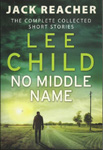 
The
real bonus for me is to see what I think was the very first Jack Reacher short
story, James Penney’s New Identity, back
in print. I will naturally claim as much credit as possible for the fact is that
this story first appeared in 1999 in Fresh Blood 3, an anthology edited
by myself and Maxim Jakubowski.
The Bruen Boom
For
a man who has made a career out of being Ireland’s leading noirista – and who, very perceptively, described noir as ‘the tunnel at the end of the
light’ – Ken Bruen’s outlook seems positively sunny at the moment. News reaches
me that there will be another series of Jack
Taylor, the ex-Garda policeman turned private eye drama filmed in beautiful
Galway, making, I think, a total of twelve of Ken’s Taylor books which have
made it to the small screen.
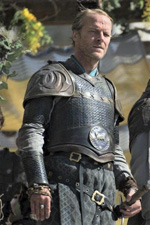 I
have always found it strange that Jack
Taylor, which I consider an excellent show, should be better known in
Germany, Holland, Belgium, Australia and New Zealand than it is in the UK. It
has been going since 2010, been critically praised and Taylor is seductively
played by Iain Glen, now a global star thanks to Game of Thrones. I
have always found it strange that Jack
Taylor, which I consider an excellent show, should be better known in
Germany, Holland, Belgium, Australia and New Zealand than it is in the UK. It
has been going since 2010, been critically praised and Taylor is seductively
played by Iain Glen, now a global star thanks to Game of Thrones.
Ken Bruen, of course, is no stranger to having his novels turned into mainstream movies – indeed I would have attended several red carpet premieres had not my invitations got lost in the labyrinthine Irish postal system – and has even been approached by television companies in Scandinavia, presumably to add a bit of Irish charm to Nordic noir. If that wasn’t enough, I understand that his 2006 novel Bust, co-written with that American master of the dark and hard-boiled, Jason Starr, is also being developed for television.
Bookmark Memories
If
one haunts second-hand bookshops as much as I do, or did when they were thicker
on the ground than they are today, one can often find a little something extra
in a previously much-loved volume. It is true that sometimes those ‘extras’ –
usually used as page-markers – are unsavoury, even disgusting, but occasionally
they are interesting, such as the time I found a high value Bulgarian banknote
in an early Eric Ambler paperback.
Possibly
the most common discovery though, is the obituary of the author carefully
snipped from a newspaper, carefully folded and inserted at the back of the
book, a rather poignant reminder of a favourite author.
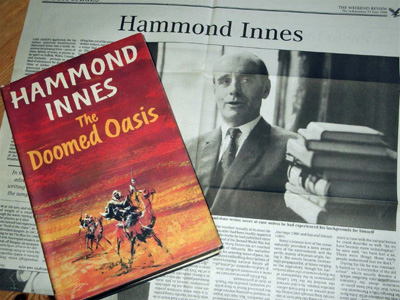
On
a recent afternoon stroll through Bloomsbury, I chanced upon a first edition of
Hammond Innes’ 1960 bestseller The Doomed Oasis but only when I had
it safely back at Ripster Hall did I discover the hidden extra of the glowing
(totally justified) obituary by Jack Adrian which appeared in The Independent on 19th June
1998. That book, which had been bought new and clearly only ever had one
careful owner, and its author must have meant a lot to that first reader 57
years ago.
Books of the Month Club
It
is purely coincidence, though a happy one that both Barry Forshaw and I have
new books out at the same time. Barry has produced another of his essential
Pocket Essential guides, this time to American crime fiction whilst I have had
the fantasies of my youthful reading fulfilled in the publication of a homage
to the great British thrillers I grew up with.
 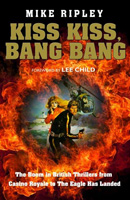
American
Noir is published by
Oldcastle as part of their Pocket Essentials series which also includes Barry
Forshaw’s invaluable guides to Brit Noir,
Nordic Noir and Euro Noir and I
understand that another volume on historical crime fiction is planned. Using a
logical, alphabetical format, Barry takes ‘noir’ in its widest sense to produce
a reference book to contemporary American crime writers, and by ‘contemporary’
he basically means ‘living’. I quickly lost count of how many he covers and I
suspect Barry has also, but it is an impressive list.
On
the other hand, many of the British authors mentioned in my Kiss
Kiss, Bang Bang from the Collins Crime Club imprint, are sadly no
longer with us, though their stories thankfully still are. I have limited my
study to the thrillers – the
adventure thrillers and the spy fiction – on which I was brought up in the days
when names such as Fleming, Deighton, Le Carré, Bagley, Lyall, Forsyth and
Higgins were guaranteed to appear near the top of bestseller lists worldwide.
I
was able to treat one distinguished thriller writer, Len Deighton, to a preview of the cover of Kiss Kiss, Bang Bang over
lunch last month, taking the opportunity to warn him that the book was
dedicated to him.
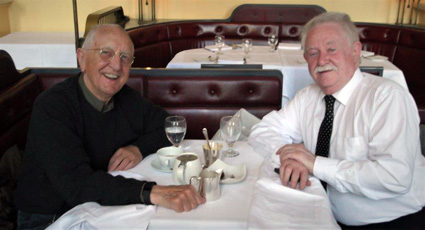
(Coincidentally,
my author copies arrived at Ripster Hall on the day the film of The Ipcress File was shown on BBC2.)
Whilst
Barry’s book provides a vital tour guide for the visitor to the land of modern
American crime fiction, all mine attempts to do is bring some vintage titles in
from the cold. The promoters of this year’s CrimeFest in Bristol have, however,
spotted an opportunity to stage a heavyweight (or overweight on my part) clash
by arranging for Barry and I to provide the grand finale to the convention in a
debate along the lines of American Noir
v. Vintage British Thrillers which will be refereed by Peter Guttridge.
Without giving anything away, I suspect the outcome will be that you can (and
should) enjoy both.
On
a far gentler tack, two of the most charming and engaging authors to emerge on
to the crime fiction scene in recent years have new books out this month,
featuring charming and engaging characters, even if one of them is a baby
elephant.
Sidney
Chambers is, of course, an Archdeacon, not an elephant, or at least he is by the
1970s for the sixth compendium of adventures as described by James Runcie.
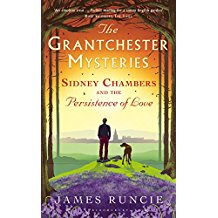
Sidney
Chambers and the Persistence of Love,
published by Bloomsbury, is the latest collection of the immensely popular Grantchester
Mysteries and sees the Cambridgeshire clerical stumbling over more crimes in
his idyllic parish that there are unexpected murders in Midsomer – a living
which I suspect has been suspiciously vacant for many years.
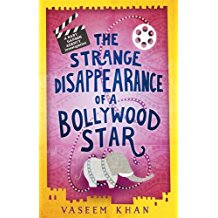
If
the quiet meadows of Grantchester are too quiet for you (despite all that crime
going on), then why not try the crowded hot spots of Mumbai and the intrigues
of Film City, or Bollywood as it is popularly known, in the company of police
Inspector Chopra (retired) and his sidekick Ganesh, a chocolate-loving baby
elephant.
The
Strange Disappearance of a Bollywood Star, published by Mulholland Books, is Vaseem Khan’s third
outing for his particular dynamic duo who are equally hindered and assisted by
a supporting cast of colourful characters, especially by some wonderfully-drawn
Indian wives and mothers who have the knack of leaving a room ‘a vision of
immaculate fury in a sari’.

For
those who like the settings exotic and their action red-blooded, they could do
no better than discover the African thrillers of Tony Park, even though he is
in fact Australian and his books tend to be published there first.
His
latest, Red Earth has now reached the UK as a Pan paperback and
although the setting is mostly the wilds of KwaZulu-Natal, this is no Rider
Haggard safari-based story, but a bang up-to-date thriller which also reveals
one of the lesser-known wildlife crimes in Africa - against vultures.
Books of the Next Month Club
Anyone
who has not read Solomon Creed may be baffled by who the eponymous hero of Solomon Creed Book Two, The
Boy Who Saw, actually is and it is not until around page 200 that
author Simon Toyne gives a few clues in his new novel published next month by
HarperCollins.
To be fair, the whole point of the story is that Solomon Creed (if that is his name) doesn’t actually know who he is, or, for that matter, why he is in southern France and involved in the gruesome murder of a Jewish Holocaust survivor. Is he a Jason Bourne-like action hero, a dangerous psychopath, a fallen angel or a Golem? (Or possibly all four?)
By
the end of the book, essentially a long escape-and-pursuit across France, the
newcomer may not feel any wiser – but then neither does Solomon Creed – and it
could be that the answer may lie not in Simon Toyne’s last thriller, but in the
three before that. That said, The
Boy Who Saw is a compulsive piece of modern Gothic hokum, which invokes
memories of Robert Ludlum, but also John Connolly and, for those with very long
memories, John Blackburn. It zips along like a bullet train in short, punchy
chapters (112 of them) which makes the whole experience annoyingly addictive.
|
|
Late News
As I no longer get invited to the right sort of party any more, I was unaware that Sara Paretsky had a new novel out last month until a copy dropped rather belatedly through the letter box here at Ripster Hall.
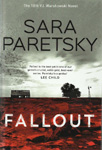
Fallout, published by Hodder, features Sara’s famous (and trail-blazing) female private eye V.I. Warshawski in her seventeenth major case, which involves her in a missing-persons investigation with roots in rural Kansas and a former nuclear missile site, the subject of a Greenham Common-style protest back in 1985.
Incredibly, it must be 35 years since Sara and V.I. Warshawski (there could be a prize for anyone who knows what the ‘I’ stands for) burst on the UK scene with Indemnity Only but I remember the gasps of admiration from reviewers at the time. It was by no means the first appearance of a female private detective (Honey West anyone – as well as Professor Forshaw?) but that book announced the arrival of a serious talent on the crime-writing scene. Sadly, it is over 20 years since I actually saw Sara, the occasion being when we hid together in the wings watching a Kinky Friedman concert.
Revival Day
The latest in the most attractive(and reasonably priced) reissues from Collins Crime Club in The Detective Club series is The GrootePark Murder by Freeman Wills Crofts. First published in 1923, this was Crofts’ last stand alone novel before he invented Inspector French, his series detective hero who was to become his most famous creation over thirty novels between 1924 and 1957.

The new edition comes with an Introduction by the most qualified person to write one: Freeman Wills Crofts himself. In fact the Introduction takes the form of an essay unseen since 1937 entitled The Writing of a Detective Novel in which he observes that he is talking about the detective story which ‘deals with detection and in which the problem is supreme: not a thriller, which depends on conflict and thrills, nor yet a crime novel, which is the history of some particular crime, usually from the criminal’s pointof view’. Interesting and possibly wise words, even 80 years on.
Girls Aloud
Back in March in the midst of a rant about the number of crime novels with the word ‘Girl’ in the title, I said I was tempted to place a bet on the fifth volume of the late Steig Larsson’s ‘Millennium’ trilogy having exactly that, even though the direct translation of the Swedish novel is The man Who Chased His Shadow.

Sadly I could not find a bookmaker willing to give me even half-decent odds, which is a pity as the English language translation of David Lagercrantz’s novel, it turns out, will be titled The Girl Who Takes An Eye for An Eye when published by the MacLehose Press in September.
I Wasn’t Expecting You, Mr Westlake
Appreciative readers came to the work of the late Donald E. Westlake in various ways. There were (and still are) devoted fans of his ‘Parker’ novels, written as Richard Stark, the most famous being The Hunter, famously filmed as Point Blank. Then there are those who preferred his lighter, ‘Dortmunder’ capers and others may have noticed his name on many a film credit. For me, though, it was early exposure some forty years ago to two of his stand-alone crime novels 361 and Killy when they were published here as Penguin paperbacks.
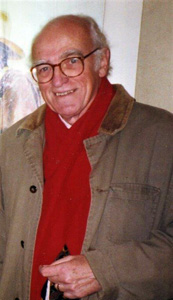
Donald Westlake (1933-2008) was a prolific author, mostly in the crime genre, who provided under numerous pen-names a wide variety of fiction which won him several Edgar Awards and the title Grand Master from the Mystery Writers of America. Yet I had never, until now, associated him with James Bond.

It appears that back in the 1990s, when the Bond film franchise was about to be re-booted with Pierce Brosnan in Goldeneye, Westlake was hired to write the story of the Bond film which would follow (which would actually be Tomorrow Never Dies). What Westlake came up with was a plot about a Western businessman seeking revenge on Hong Kong – both its banking system and the island itself – just as it is about to be handed over from British to Chinese rule. There were to be submarines, a huge gold bullion heist and a ‘doomsday weapon’ known as a soliton wave which could actually dissolve the island to sludge.
For various reasons, Westlake’s treatment was not accepted but never being one to throw away an idea, Westlake fleshed out his story into a full length novel (minus ‘James Bond’) called Forever and a Death, which has, oddly, remained unpublished until rescued by the Hard Case Crime imprint of Titan Books, who will release it in June.
Die-hard Bond fans should not expect an Ian Fleming novel, but Westlake fans will appreciate this posthumous swan-song. The only thing which jarred with me was that the megalomaniac villain was not called Kleb, Drax, Blofeld or Scaramanga, but rather ‘Richard Curtis’. I may never be able to see Four Weddings and A Funeral in the same light again.
Non-Metropolitan Elite
Being of great age, I can remember the desperate cries, some thirty years ago, of crime reviewers such as John Coleman of The Sunday Times, for more crime fiction to be set outside of London, as it seemed at the time that only Oxford was served with a decent proportion of non-metropolitan homicide.
That situation was fairly quickly resolved with the arrival of non-London based policiers, notably starring Inspector Rebus in Edinburgh and Inspector Resnick in Nottingham and today the whole country is pretty much covered, from Graham Hurley’s West Country detective duos to David Mark’s Hull-based coppers and just about everywhere inland.

Although I cannot claim any affinity with, or indeed knowledge of, I have always thought Liverpool, for a city of such size and importance (it has, after all, two football teams: Everton and Everton Reserves), to be under-served by fictional detectives. However, Mark Roberts seems very capable of redressing the balance with his excellent series featuring DCI Eve Clay, of which Day of the Dead is the third and which is published this month by Head of Zeus.
Over the Pond
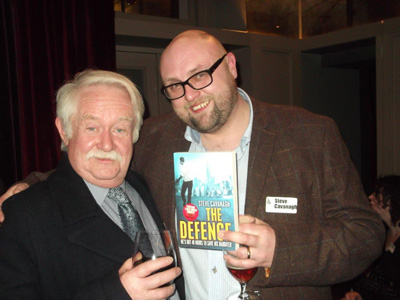
When I met the affable Steve Cavanagh last year I suggested to him that his career as a civil rights lawyer in Belfast and Dublin must have been a quiet one as he had chosen to set his crime fiction in America.
I am, however, rather glad it was and that he has continued to look across the Pond for inspiration, as The Liar, out this month from Orion is a hard-nosed legal thriller which crackles with action and some wonderfully dodgy characters.
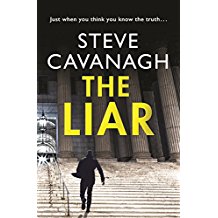
The Liar stars Eddie Flynn, a street-smart lawyer who used to be a con artist and can still practice a fair piece of sleight-of-hand when needed. That may sound like a familiar c.v. for many a lawyer, but Eddie Flynn finds his old skills come in very useful in a complex case of kidnapping where the victim is the daughter of an established security consultant and hostage negotiator – and therein lies the first of many a plot twist.
Dennis the Manipulator
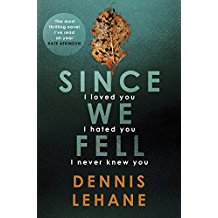
Since We Fell by Dennis Lehane, out this month from Little, Brown begins with 37-year-old Rachel shooting her husband, though it’s quite a while before you learn which husband and why. Long before then you realise that Rachel has been a victim for most of her life and when she resorts to violence it’s not because she’s paranoid – they really are out to get her, though exactly who and why are still unclear.
The setting is Boston and Rhode Island – where it always seems to be raining – and Haiti where the aftermath of a recent earthquake is only one of the horrors experienced there. Lehane’s central character Rachel is a journalist with a snakes’ nest of issues from her childhood (thanks to a distinctly un-maternal mother) and a not particularly good track record with men.
Since We Fell, despite a couple of eyebrow-raising moments when disbelief must be seriously suspended, is a gripping psychological thriller where the reader is cunningly misled and manipulated – and loves every minute of it.
Sideline
Always keen to make sure I consume the recommended 5-A-Day (although disappointed to discover this involved vegetables), I was surprised by the new packaging on Sainsbury’s delicious golden carrots which showed they were grown in Fife, Scotland by none other than Ian Rankin.

A Word to the Wise
The Ripster has had a computer malfunction and would appreciate receiving emails from the usual suspects to help recreate his address book. No Hawkers, PPI salesmen or time-wasters please.
Pip! Pip!
The Ripster
|